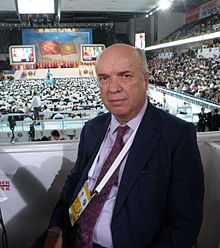Fehmi Koru
Fehmi Koru (* 1950 in Izmir ) is a Turkish journalist.
Life
Koru's parents are from Prizren . He attended the religious high school in his hometown and studied theology at today's University of September 9th . He then lived in London and Damascus . He received his PhD from the Center for Middle Eastern Studies at Harvard University and then worked as a research fellow at the Center for International Studies at the Massachusetts Institute of Technology .
In 1984 Koru became a writer and editor of the Millî Gazete newspaper . In 1986 he became the founding chief editor of Zaman , for whom he worked as chief commentator and temporarily as capital correspondent even after he left the chief editor in 1986 to 1998. From 1998 to 2010 he was a columnist and partly also capital correspondent for Yeni Şafak , then returned briefly to Zaman before moving on to Star (2011–2014) and finally to Habertürk (2014–2016). In addition, he worked as a television commentator for various broadcasters, including NTV , ATV and Habertürk TV .
In April 2013, Koru was appointed by the then Prime Minister Recep Tayyip Erdoğan to a commission called the “Council of Wise Men” , which was supposed to accompany the peaceful end to the conflict with the Kurdish PKK in civil society , but ultimately remained quite ineffective.
Positions
Fehmi Koru is described by Rıfat N. Bali as one of the most famous conspiracy theorists in Turkey. In Fehmi Koru's opinion, the Mossad is behind September 11 , the murder of Uğur Mumcu , the assassination attempt on Yuda Yürüm and the death of Princess Diana. Ecevit's illness is a conspiracy. Rahmi Koç had secretly become a Christian, the video of the beheading of Nicholas Berg was a fake and the Illuminati would rule the world. Under the guise of scientific research, Koru even referred to Holocaust deniers in one of his books. Koru always makes sure that he is just an ambassador and wants to inform.
Because he said on a television program in 1999 that the people are divided into “believers and unbelievers”, Koru was charged with sedition but acquitted. With his articles on April 30 and May 1, 2001 in Yeni Şafak , Koru was the first to write , albeit under a pseudonym, about the (alleged) secret organization Ergenekon . He is said to have been on the organization's death list.
For a long time Koru was regarded as a pioneer of the Justice of the Upswing Party (AKP), always emphasizing that it is not about democratizing or modernizing Islam , but about Muslims . He wrote in 2004 that if the AKP pushes democratization and develops into a “government reconciled with its own people and its own history”, it could become a model for the whole world and remove the basis for terrorism .
In 2008 the first conflict arose with the then Prime Minister Recep Tayyip Erdoğan , to whom he reproached that he had " started like Obama and landed like Bush ". Koru is now clearly disappointed in Erdoğan and accuses him of not adhering to the constitutional limits of the office. In January 2017 he called on the AKP to return to the “factory settings of 2002”, that is to say to the “democratic values” of their early days.
Fehmi Koru is one of the signatories to the Amman Embassy .
Works
- İslam'ın uluslararası ilişkiler kuramı (Eng: Islam's Understanding of International Relations ), co-author: Ahmed Ebu Süleyman, 1985
- Bilginin İslâmîleştirilmesi (German: The Islamization of Knowledge ), 1986
- Mekke'de ne oldu (Eng .: What happened in Mekka ), 1987
- American gizli raporlarında Türkiye'de İslamcı akımlar (German: Islamist currents in Turkey in American secret reports ), co-authors Sabri Sayari, Yılmaz Polat, Istanbul 1990
- Türkiye'de lâiklik ve fikir özgürlüğü, (Eng .: secularism and freedom of expression in Turkey ), 1991
- Yeni Dünya Düzeni (German: The New World Order ), 1991, ISBN 975-473-002-4
- Terör ve Güneydoğu sorunu (German: Terror and the Southeast Anatolia Problem ), 1992
- Güneydoğu Anadolu (German: Southeast Anatolia ), 1995, co-authors Ahmet Kabaklı et al.
- Taha Kıvanç'ın Not Defteri (Eng .: Taha Kıvanç's notebook ), 1996
- One Column Ahead: observations of a Turkish journalist on the eve of a new millenium, Istanbul 2000, ISBN 975-362-535-9
- Tabana Kuvvet (German: Kraft für die Basis ), 2000, ISBN 975-362-569-3
- 11 Eylül, O Kader Sabahı (German: September 11th, this fateful morning ), Istanbul 2002, ISBN 975-362-679-7
- Yerli ve özgün: Nobellik bir öykü (German: local and original: a story that is worthy of a Nobel Prize ), 2003, ISBN 975-6714-25-5
- Ben Böyle Gördüm - Cemaat'in Siyasetle Sınavı, Alfa Yayıncılık, 2016, ISBN 9786051712789
Web links
- Biography on www.biyografi.info (Turkish)
- Personal blog (Turkish)
Individual evidence
- ↑ Rifat N. Bali: Komplo Teorileri: Cehaletin ve Antisemitizmin ReSM i Geçidi. Istanbul 2016, pages 102, 104, 131, 146, 212, 266f.
- ↑ Gazeteci Fehmi Koru'ya beraat , Hürriyet, March 5, 2002.
- ↑ Danıştay saldırısı öncesi telefon trafiği incelenecek , CNN-Türk, November 20, 2008.
- ^ Karen Krüger: Horror after the raid , Frankfurter Allgemeine Zeitung, January 24, 2008.
- ↑ İslam asla Demokratikleşemez! .. , Interview with Radikal, October 20, 2003.
- ↑ Fehmi Koru: Ak Parti AB'yi neden ister? , Yeni Şafak, December 21, 2003.
- ^ Gunnar Köhne: Erdogan under pressure , Deutschlandfunk, November 26, 2008.
- ↑ Thomas Seibert: Erdogan went from reconciler to splitter , Tagesspiegel, November 1, 2008.
- ↑ Fehmi Koru: Ya 2002'nin fabrika ayarlarına döneriz, ya da İran'a benzeriz , T24, January 28, 2008.
| personal data | |
|---|---|
| SURNAME | Koru, Fehmi |
| BRIEF DESCRIPTION | Turkish columnist |
| DATE OF BIRTH | 1950 |
| PLACE OF BIRTH | Izmir |
